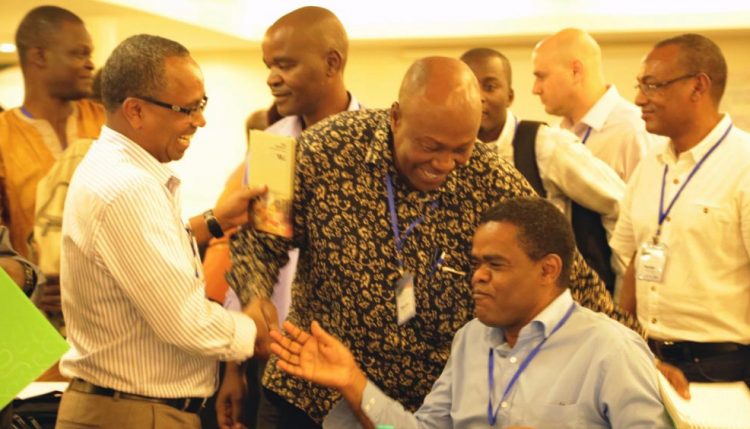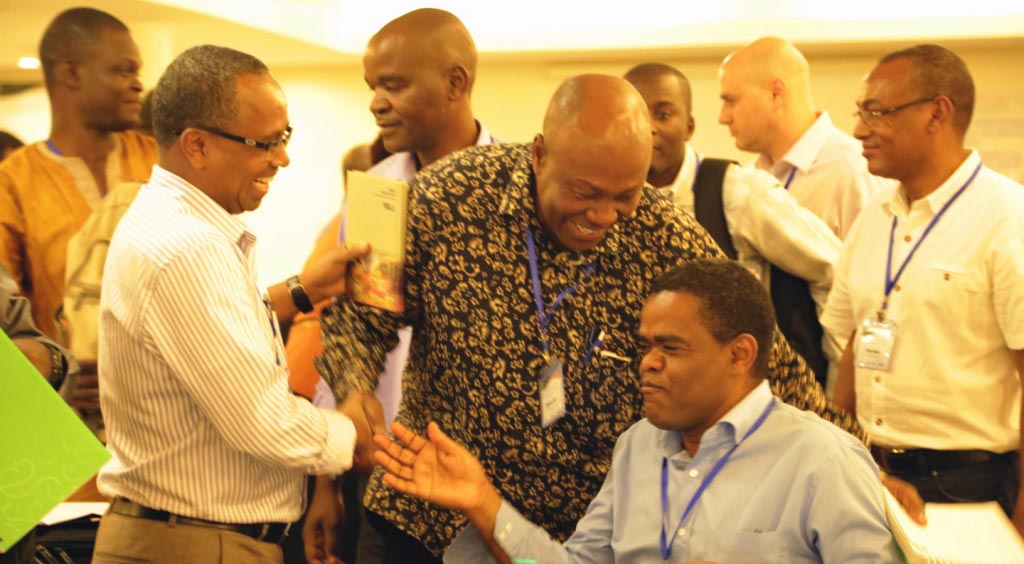
Africa RISING partners kick off phase 2 with a science for impact event
Approximately 80 people representing different organizations and a diverse group of partners in agricultural research and development gathered in Dar es Salaam to participate in the Africa RISING science for impact event. The 17–19 January meeting also doubled up as a launch event for a second 5-year phase of the USAID-funded Africa RISING program. The choice of venue, Tanzania’s port city of Dar es Salaam, bore a historical significance—this was the “birthplace” of the program 5 years ago.
Over the 3-day event, participants, including implementing partners from six Africa RISING countries, representatives from USAID, and local and international development organizations reviewed the research achievements of Africa RISING phase 1 while at the same time proffering options for the next step―getting the technologies (at scale) into the hands of smallholder farmers.
Day 1 focused on phase 2 elements, zooming in on what had changed, what was new, and what remained from phase 1, and a poster-bus-stop process that went on to day 2, providing a rich 3600 view of the technologies developed, tested, and refined by partners from the six program countries.
Day 3 assessed various scaling models and approaches used to achieve impact at scale.
Big, achievable vision of success
In his opening remarks, IITA Director for Central Africa and Chair of the Africa RISING Program Coordination Team Bernard Vanlauwe explained the targets and ambitions of phase 2 of the program. “We have achieved a lot in terms of identifying best-bet technologies in phase 1. In the second phase we therefore need to adopt dynamic scaling approaches to ensure that these technologies get into the hands of millions of farmers who are counting on us. While this is something we (as project implementers) have expressed a lot of appetite for, our donor―USAID―has made this an imperative for us as an extra motivation,” he said.
At the program level, Africa RISING has set itself a target to scale sustainable innovation technologies to more than 1 million households in the six project countries through various development partnerships. The program is working
on various arrangements for co-investment for wider uptake and adoption of its outputs which will in turn
generate a “partnership dividend” that allows a research project like Africa RISING to actually generate impact at scale.
Continuity with evolutionary change
“Africa RISING phase 2 will be a fine blend between continuity from phase 1 and evolutionary change,” explains Peter Thorne, Africa RISING Ethiopia Project Manager. “IITA and ILRI will continue leading the program, which will retain its geographic focus on Ethiopia, Ghana, Malawi, Mali, Tanzania, and Zambia. IFPRI will lead on data management, monitoring, and impact assessment. And ILRI will continue to lead a communication and knowledge sharing component at program level,” he added.
The three regional projects that make up the Africa RISING program―West Africa, Ethiopia, and East/Southern Africa, will therefore use lessons, where appropriate, to improve the program’s ways of operating (for example, in terms of cross-project harmonization). This will significantly broaden engagement with development partners which, backstopped by target Africa RISING research, will be able to generate impact on Feed the Future target indicators at scale.
“To achieve the best results, the Africa RISING program has to channel the wealth of experiences and lessons learned from phase 1 and make them into successful implementation strategies and plans for the second phase,” notes Irmgard Hoeschle-Zeledon, Manager, Africa RISING West Africa and East/Southern Africa Projects.
Program-wide synergies will be built around shared analyses, common research questions, coordinated communities of practice, and learning supported at the program level by investments in M&E, communications and knowledge sharing, and a light coordination structure.
At a critical point and building on good foundations
Siboniso Moyo, ILRI program leader and Africa RISING Program Coordination Team member, notes that the shared vision and commitment by project partners are two critical elements that currently abound within the program, hence the optimism.
“Africa RISING is not the culmination of a journey, but a continuation of one that we all set off on 5 years ago. We had extensive synthesis in the first phase. I am certain you all appreciate that there were great achievements in the first phase, but we also have to learn from some challenges. We are at a critical point, transitioning from one phase to another and we are confident that we have good foundations to build on. We can visualize together and commit to delivering on set objectives of the program which we will all come back to in 5 years’ time and check that we have delivered,” she said at the close of the event.

